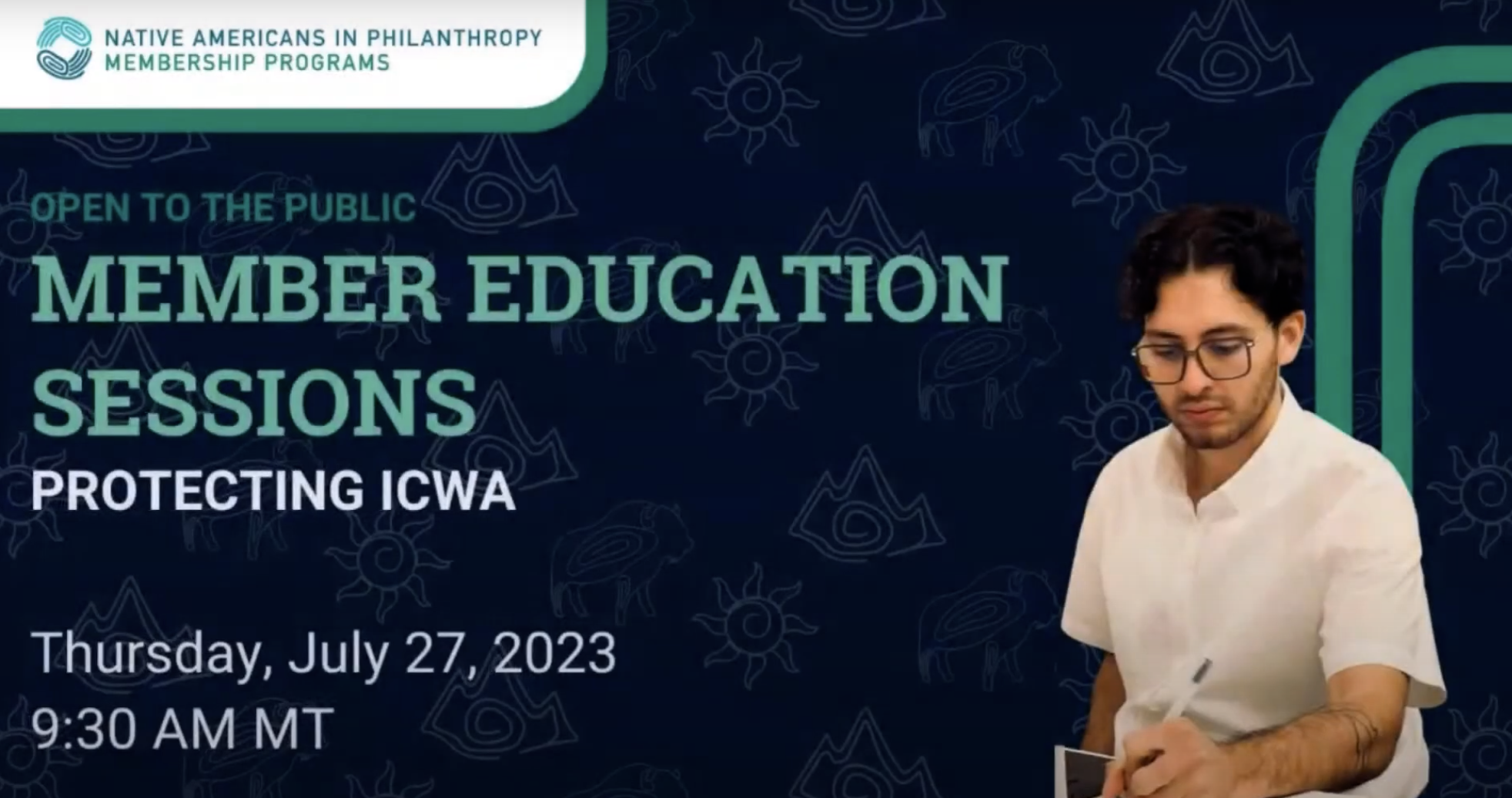
The passage of the Indian Child Welfare Act in 1978 was the result of a movement of Native people and their allies to repudiate a destructive system that stole our children and broke apart our families, all in an attempt to dismantle our cultures. Decades later, the highest court in the land recognized what our ancestors fought for and drew a line in the sand about our ability to protect our children and families. As with the original passage, the decision in Haaland v. Brackeen was made possible because our people were organized. Our broadcast begins with a fireside chat between Native Americans in Philanthropy CEO, Erik Stegman (Carry the Kettle First Nations – Nakoda), and Dr. Sarah Kastelic (Alutiiq), Executive Director of the National Indian Child Welfare Association. They are then followed by a panel discussion with moderator, Brittany Schulman (Waccamaw Siouan), when Dr. Kastelic is joined by Indian Child Welfare champions, Erin Dougherty Lynch, Aurene Martin (Bad River Band of Lake Superior Chippewa), and Dr. Joannie Suina (Pueblo of Cochiti) for a discussion on the historic reaffirmation of ICWA, what’s next, and how philanthropy can support the sustainability of this vital work.
Watch the broadcast now on NAP’s YouTube Channel and be sure to subscribe to the NAP YouTube channel for more informative and important resources on Native communities.
Executive Director, National Indian Child Welfare Assoc.
View BioDr. Sarah Kastelic (Alutiiq), an enrolled citizen of the Native Village of Ouzinkie, became the Executive Director of the National Indian Child Welfare Association (NICWA) in January 2015. Prior to joining NICWA as chief of staff in 2011, Sarah led the National Congress of American Indians’ (NCAI) welfare reform program and, in 2003, was the founding director of NCAI’s Policy Research Center. She began her career at the Bureau of Indian Affairs central office as a child welfare specialist in 1998. She earned a master’s degree and PhD from the Brown School of Social Work at Washington University in St. Louis, where she serves as adjunct faculty. Sarah has served as principal investigator of several national federally and privately funded research projects, partnering with Tribally-based and urban Indian communities. She has authored numerous publications, including journal articles, book chapters, and curricula. She is a member of the boards of directors of the Independent Sector, Generations United, Native Ways Federation, and Underscore.
Managing Attorney & Staff Attorney, Native American Rights Fund
View BioErin is a Senior Staff Attorney and the Managing Attorney of NARF’s Anchorage, Alaska, office. At NARF, Erin works on a variety of federal Indian law issues, including Indian and Tribal child welfare, subsistence hunting and fishing rights, co-management/co-stewardship agreements, voting rights, Tribal jurisdiction and sovereignty, Tribal sovereign immunity, and issues related to Alaska Native communities and climate change. Erin leads NARF’s Indian child welfare work and is heavily involved in national efforts to protect the Indian Child Welfare Act (ICWA). With co-counsel, she has authored Tribal amicus briefs in all three of the federal court challenges to ICWA, including, most recently Haaland v. Brackeen, where she is the counsel of record on the Tribal amicus brief representing 497 federally recognized Tribes and 62 Tribal and Indian organizations. Since 2010 she has represented the Bering Sea Elders Group, an organization of thirty-eight Yup’ik, Cup’ik, St. Lawrence Island Yupik, and Inupiaq Tribes in Western Alaska that work to protect the traditional resources of the Bering Sea. She is also involved in two federal court cases representing a Tribe, a Tribal organization, and Alaska Native individuals to protect Alaska Native subsistence rights―work that has been central to NARF Alaska’s docket since the office opened in 1984. Erin joined the Native American Rights Fund in 2009 as a Skadden Fellow, following a clerkship with the Honorable Dana Fabe, then Chief Justice of the Alaska Supreme Court. Erin received her J.D. from the University of Michigan Law School where she was the co-chair of Michigan’s Native American Law Students Association, served on the National Advisory Committee for Equal Justice Works, and served as an Article Editor and the Administrative Manager for the Michigan Journal of Gender & Law. Erin received her B.A. from Willamette University where she was a Truman Scholar. She was also a Fulbright Scholar based at the University of Tromsø where she conducted masters-level research on Indigenous political mobilization and self-governance. Erin is a member of the Alaska Bar, as well as the bars of the United States Supreme Court, the United States Courts of Appeals for the Fourth, Fifth, Eighth, Ninth, Tenth, and District of Columbia Circuits, and the U.S. District Court for the District of Alaska. Erin also serves on the Alaska Bar Association’s Committee for Pro Bono Service and the Committee on Fair and Impartial Courts and is a member of the Alaska Court System’s Court Improvement Program and Chair of its ICWA Subcommittee.
President, Spirit Rock Consulting
View BioAurene Martin is the President of Spirit Rock Consulting, Incorporated, and a member of the Bad River Band of Lake Superior Chippewa. She has extensive experience in federal Indian Law and Policy, having served in several Tribal and Federal key government positions. At Spirit Rock Consulting, Ms. Martin represents Indian Tribes on Federal law and policy issues. She specializes in the areas of Tribal land acquisition and the fee-to-trust process, Tribal gaming, and general Tribal government issues. She also handles a significant number of legislative policy issues and has recently successfully advocated on behalf of her clients on issues relating to Federal land transfers and Federal tax issues. Prior to entering private practice, Ms. Martin had a lengthy career in public service. As a high-level political appointee at the Department of the Interior, she originally served as Counselor to the Assistant Secretary of Indian Affairs. She was elevated to Principal Deputy Assistant Secretary and served for over a year as the Acting Assistant Secretary for Indian Affairs before leaving the Department. Before joining the Department of the Interior, she was Senior Counsel to the Senate Committee on Indian Affairs chaired by U.S. Senator Ben Nighthorse Campbell (R-CO), where she had a key role in developing legislation involving Tribes, particularly in the areas of gaming and health care. Ms. Martin came to the Committee from the position of Director of Congressional and Public Affairs for the National Indian Gaming Commission in Washington, D.C. Aurene began her career as Senior Staff Attorney of the Oneida Tribe of Indians of Wisconsin, where she worked for over five years. As in-house counsel to the Tribe, she was responsible for Indian Child Welfare Act litigation, state legislative affairs, and gaming matters, and served on the Tribe's compact negotiation team in 1998. While at the Oneida Tribe, Aurene was responsible for the day-to-day litigation of Indian Child Welfare Act cases for the Tribe and also developed legislative testimony provided by the Tribe before Congress regarding the Act. Ms. Martin attended the University of Wisconsin-Madison and the Università di Bologna in Bologna, Italy. She majored in History, Italian, and History of Culture and received a Bachelor of Arts degree in 1989. She received her Juris Doctorate degree from the University of Wisconsin Law School in 1993. She is a member of the District of Columbia and Wisconsin State Bar. Aurene has been active in the Wisconsin State Bar Indian law section, having served as an officer of the section.
Development Officer, National Native American Boarding School Healing Coalition
View BioJoannie Marie Suina is an EcoFeminist Indigenous scholar from the Pueblo of Cochiti, NM whose works seeks to illuminate the ongoing healing efforts led by Native Women in Native Communities. Suina is the beautiful blending of her Puebloan, French, and Irish Roots. She stands beside her community as a daughter, mother, auntie, and cultural revitalizer. Suina holds a B.A. in Native American Studies, a Master of Jurisprudence in Indian Law, and recently completed her doctoral studies at the University of Washington, Tacoma (Muckleshoot Cohort for Native American Educational Leadership Scholars) where she earned a Doctorate in Education, Educational Leadership. From 2018 to 2023, Dr. Suina also had the honor of serving on the NABS Board of Directors.

Senior Vice President of Programs, Native Americans in Philanthropy
View BioBrittany Schulman is an enrolled citizen of the Waccamaw Siouan Tribe and grew up in rural North Carolina. As a traditional storyteller, Brittany’s perspective is grounded in her experience growing up with her mother, siblings, and grandparents on their family farm and her Waccamaw Siouan community. Brittany is a lifelong learner and educator and integrates her Indigenous values into everyday life. She is a results-driven educator and public speaker with a track record of maximizing efforts through relationships. As an advocate, Brittany has served in many leadership roles to ensure that Native Americans and Indigenous values are not only included but also at the forefront in every conversation. Recognized for providing practical, sustainable solutions to business challenges with exceptional communication skills and project management with a passion for Indigenous peoples, Brittany is currently the Senior Vice President of Programs, where she continues her work as an organizer and educator. Brittany is married to a wonderfully supportive husband, Joseph (Leech Lake Ojibwe) and they have two children.
We will soon welcome you to submit your event to be featured on our Events page. Whether it's a cultural gathering, educational seminar, or philanthropic initiative, your event plays a crucial role in fostering greater visibility and representation for Native communities in the philanthropic sector. Stay tuned!
Changing the conversation.
Get the latest NAP news.